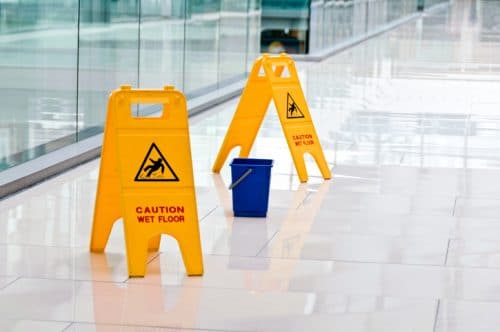If you fall inside or outside of a store, you may be able to sue them for your injuries.

Slip and fall accidents are disturbingly common in stores around the country. What you may not realize is that whenever a business opens its doors to customers, it is legally responsible for their safety. This is known as premises liability — the idea that when someone is on your premises, you have the legal responsibility to keep them reasonably safe.
This is true for both big box stores like Target, Costco and Home Depot as well as for mom and pop stores. Any store or business that invites the public in to purchase goods has a duty to prevent their customers from being harmed (the harm that they can reasonably foresee, that is). If you are injured by slipping and falling at a business, you may have a viable claim against that business.
At the Law Offices of Larry H. Parker, we are experienced slip and fall attorneys. We have helped hundreds of clients recover for their falls at stores and other businesses — and we will help you do the same! We never charge a fee unless we recover a settlement or award for you — and initial consultations are always free.
How Stores May Be Liable
If a store does not keep their premises reasonably safe, they could be responsible for any injuries that result. This can happen in any number of ways.
Outside of the store, the owners are responsible for keeping the walkway clear and hazard-free. While snow and ice generally aren’t concerns in California or Arizona, other issues could result in a fall. If a floor mat is bunched up, for example, a patron could trip on it and be seriously injured in a fall. If a sidewalk is crumbling or a stairway doesn’t have a railing, a customer’s fall could result in a successful lawsuit.
Inside of a store, if there is poor lighting or any sort of spilled liquid on the floor, that could mean trouble. These conditions could easily cause a fall — which can lead to someone getting hurt. If something is spilled at a store or business, it is their responsibility to clean it up promptly, use cones to warn patrons of the hazard, and make sure that nobody is hurt.
The bottom line is that if a dangerous or hazardous condition is known about by the store owner (or should have been known) and a customer slips and falls, the store can be held financially responsible if it did not take any steps to fix the problem. The keys are (1) knowledge and (2) failure to remedy.
This can be demonstrated by an example involving a spilled carton of milk. If a patron drops a jug of milk on the floor and it breaks, sending liquid everywhere, that is a hazard for other shoppers. If someone is walking along right behind him when the spill happens, the store is probably not going to be held liable for his injuries if he slips and falls on the milk. If, however, the spill happened half an hour ago and no one cleaned it up or blocked the area off from use until it could be cleaned, then anyone who falls after the manager and/or employees had knowledge could potentially sue the store for their slip and fall injuries. It all comes down to if the manager and/or employees knew, when they knew, and what steps they took to address the dangerous condition.
If you have slipped and fallen in a store, contact a skilled slip and fall attorney immediately. Your lawyer can take steps to ensure that you are able to recover for your injuries, including asking the store manager and/or employees to preserve security tapes and other evidence of your fall. You should also document the accident as soon as possible while the details are fresh in your mind. If possible, take pictures of the scene, get the names of any witnesses, and ask for the store’s incident report.
Next, contact the Law Offices of Larry H. Parker at 800-333-0000 or info@larryhparker.com. We will aggressively pursue your right to recovery and will never charge you a fee unless we get money for you.



